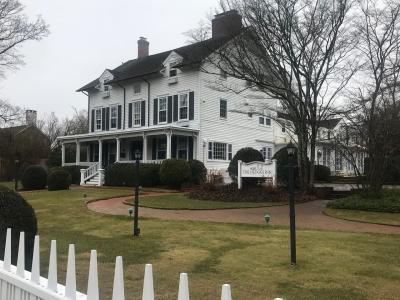The Hedges Inn Sues Over Weddings

The Hedges Inn, a historic James Lane establishment popular for weddings, has sued the East Hampton Village Board of Trustees, the Zoning Board of Appeals, and Kenneth Collum, the building inspector, seeking to reverse a decision that it cannot hold outdoor events, as well as financial damages and the reimbursement of legal fees. The lawsuit was filed in State Supreme Court on Jan. 25.
The suit alleges that the inn, a pre-existing business in a residential district, was illegally targeted by a law the village passed last April that prevents such properties from having mass gatherings outdoors or in tents. It also accuses the village of “arbitrary and capricious” enforcement of the zoning code.
Providing a venue for outdoor events was a critical part of the Hedges Inn’s business, the suit claims, calling the law a “de facto taking of the property.”
The suit also makes the village decision personal, by claiming officials, including Mayor Paul F. Rickenbach Jr., had been “recruited” by Peter and Patricia Handal, neighbors and longtime critics of events at the inn, to ban parties there. The suit alleges village trustees or other government officials improperly influenced members of the Z.B.A., who ruled in November that the inn should not be allowed to hold outdoor events.
“The village will defend itself in any lawsuit that seeks to invalidate or make inconsistent any provisions of the zoning code,” Becky Molinaro Hansen, the village administrator, said in response to the suit.
The suit is the latest development in a nearly yearlong battle between the inn and the village, which previously had approved permits for special events there but reversed course last March, denying tent permits for four weddings scheduled for 2018. The reversal came one month after the village introduced a special events law, which went into effect on Oct. 1.
The suit claims the law violates the state constitution because, among other failings, it exceeds the village’s power to regulate land use. “The enactment constituted an illegal spot zoning not in accordance with a comprehensive plan and designed to benefit a single property owner,” the suit states, referring to Mr. and Mrs. Handal.
The owners of the inn, the suit claims, were selectively mistreated by the law, which allows outdoor gatherings at other properties in the district, including “semi-commercial” ones, such as the village-owned Mulford Farm, where the historical society, among others, holds events.
According to the suit, the initial basis for denying special event permits for the inn was due to an inaccurate determination by Mr. Collum that it was ineligible based on a Z.B.A. ruling in 2004 that annulled the use of its patio for outdoor dining because the owner of the inn at the time failed to demonstrate it was a pre-existing use. The decision was later upheld in State Supreme Court and the Court of Appeals.
In September, Christopher Kelley, the Hedges Inn’s attorney, sought to have Mr. Collum’s decision overturned by the Z.B.A. He argued that the 2004 ruling only prohibited nightly dining on the patio and did not outlaw catering or parties in tents. The Z.B.A., however, did not agree. The suit alleges its ruling was discriminatory because the board determined a “different level of scrutiny” was needed based on the inn’s pre-existing, nonconforming status.
The suit also claims that at least one Z.B.A. member had referred to a memo written by Linda Riley, an attorney for both the Z.B.A. and the village board, with regard to how officials intended to vote on the inn’s application, but the memo was not included in the written record, and a Freedom of Information Act request for the document filed by the inn’s attorneys had been denied.
The suit claims the board’s decision was flawed because it was based in part on information received outside the scope of the public hearing on its application. It also alleges that village trustees and Z.B.A. members had engaged in a “concerted effort” to prevent the inn from having outdoor events at the behest of Mr. and Mrs. Handal.
Jennifer Lilja, the general manager of the inn, released a statement on Monday in which she cited Mrs. Handal, who has been outspoken about noise and traffic at the inn, as the driving force behind its battle with the village. “It is absolutely clear to us, that the special treatment she has received is a gross misuse of power that should not be tolerated,” she said.
